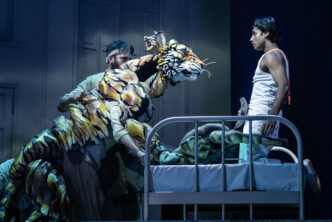Manchester International Festival makes a fantastic cultural contribution to the city in commissioning events that bring together top talent from across the globe. But, sometimes it is good to be reminded of the extraordinary talent we have right here on our doorstep, and The Skriker, a co-commission by MIF and the Royal Exchange Theatre, does just that.
Regulars to the Royal Exchange will be familiar with the stage work both of its artistic director, Sarah Frankcom, and actress Maxine Peake, who collaborated most recently for a sell-out run of Hamlet. Here again Peake takes on the eponymous role and places her stamp even more firmly on it as creative associate on the project. However, as with all things MIF, there is a twist. This is not the Royal Exchange as we know it. And indeed I imagine that it will be quite some time before we can experience anything quite like it again, not least because of the cost of removing the stalls in order to create Lizzie Clachan’s oppressive and immersive set. There are 20 or so seats at stage level for those brave enough to be centre of the action, but that is it.
The play is not one I am familiar with. Written by Caryl Churchill, it was first performed at the National Theatre in 1994, and it’s clear to see why it has been rarely performed since. It is not easy to watch and is clearly challenging to stage, not least because of the demands it places on the lead role of the Skriker. The Skriker eludes definition. It is a faerie, a spirit, a shape-shifter – which appears in various forms as an old woman, a child and a young man. Whatever form the Skriker takes, its presence is not good. It is a physical role that demands attention, either through desperation, neediness or sheer wretchedness.
Peake, as always, is compelling to watch, speaking in complex poetry of alliteration and rhyme, interspersed with a coarseness that has the effect it’s supposed to. In a single breath she goes from pleading to demanding, needy to menacing. She is ably supported by Laura Elsworthy (Josie) and Juma Sharkah (Lily), as the two vulnerable sisters whom the Skriker sets its sights on.
It is not clear why the Skriker fixates on these two girls, one clearly mentally unstable and hospitalised for troubled thoughts, the other a young mum with a kind heart who just wants to help. The programme says that the play is about the pollution of our environment by consumerism and demands a call to action from the audience. There were clearly environmental references and prophecies of doom, but the play didn’t offer any path to redemption. There is an inevitability about the destruction – whether treated with contempt or compassion, the Skriker wreaks havoc on the lives of those around it.
That said, while The Skriker will no doubt be a talking point I don’t think it helps to look too deeply for any meaning behind it. What has been created, quite brilliantly, is a nightmarish experience from which there is no escape. Even the original score composed by Nico Muhly and Antony (of Mercury prize winners, Antony and the Johnsons) is more noise than music – the whole effect is hellish, and it is meant to be.
In all, The Skriker is an event of a play that is difficult to explain because it is an experience that sweeps you up without your knowing what’s happened. I came out of it quite relieved to breathe in the fresh air. So I suppose if there is a call to action, that is it.
The Skriker is at The Royal Exchange from 2 July to 1 August 2015.




